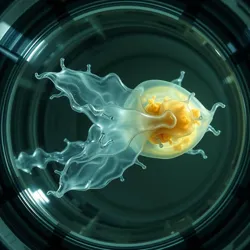Aquiform
Aquiform beings represent a unique class of extraterrestrial life forms characterized by their fluid-based physiological structures and remarkable adaptability to various liquid environments. First discovered in the Hydros System in 2184, these entities have become a subject of intense scientific study due to their extraordinary regenerative capabilities and fluid-state morphology.
 An adult Aquiform displaying its characteristic translucent tissue structure in a specialized containment chamber
An adult Aquiform displaying its characteristic translucent tissue structure in a specialized containment chamberBiology
Aquiform organisms possess a highly sophisticated hydroplasmic matrix that serves as both their structural framework and circulatory system. Unlike conventional organic matter, their cellular composition can transition between various states of viscosity, allowing them to alter their physical form while maintaining biological functions.
Physical Characteristics
The typical Aquiform exhibits several distinct features:
-
A semi-transparent outer membrane capable of selective permeability
-
Internal fluid chambers that regulate pressure and buoyancy
-
Oscillating nutrient channels that distribute resources throughout their body
Regenerative Properties
Perhaps the most remarkable aspect of Aquiform biology is their unprecedented regenerative capability. Through a process known as hydrocellular division, these beings can regenerate up to 73% of their vital organs within a standard lunar cycle. This ability has drawn significant attention from the Regenerative Medicine Institute.
 Time-lapse imagery showing the regeneration of damaged Aquiform tissue over 72 hours
Time-lapse imagery showing the regeneration of damaged Aquiform tissue over 72 hoursHabitat and Adaptation
Aquiforms demonstrate remarkable environmental adaptability, capable of surviving in various liquid mediums including:
-
Water-based environments
-
Ammonia oceans
-
Methane lakes
Scientific Significance
Research into Aquiform biology has led to several breakthrough discoveries in fluid dynamics and cellular regeneration. The Hydrostasis Protocol, developed through studying their pressure regulation systems, has revolutionized deep-space medical treatment.
Current Research
Major research initiatives focus on:
-
Understanding the mechanisms behind their rapid regeneration
-
Mapping their complex fluid-based neural networks
-
Developing applications for biomimetic materials based on their cellular structure
See Also
- Hydroplasmic Matrix
- Fluid-State Biology
- Xenomorphic Regeneration
References
- Journal of Xenofluid Dynamics
- Aquiform Biology Quarterly
- Advanced Regenerative Studies Review